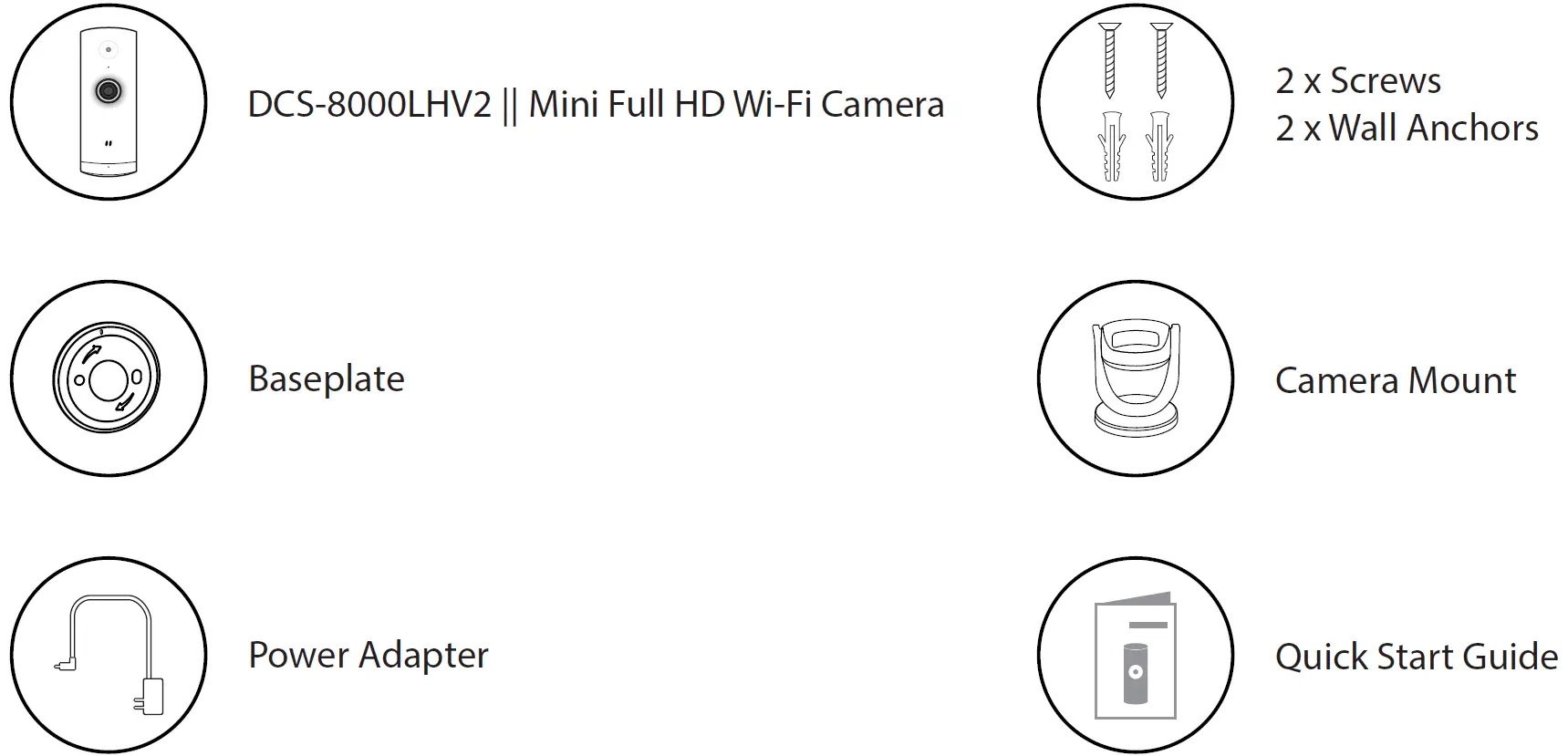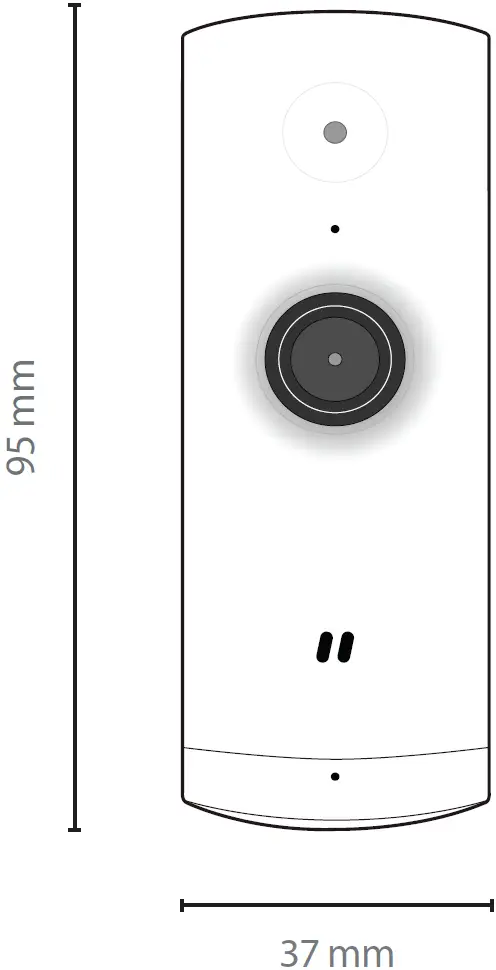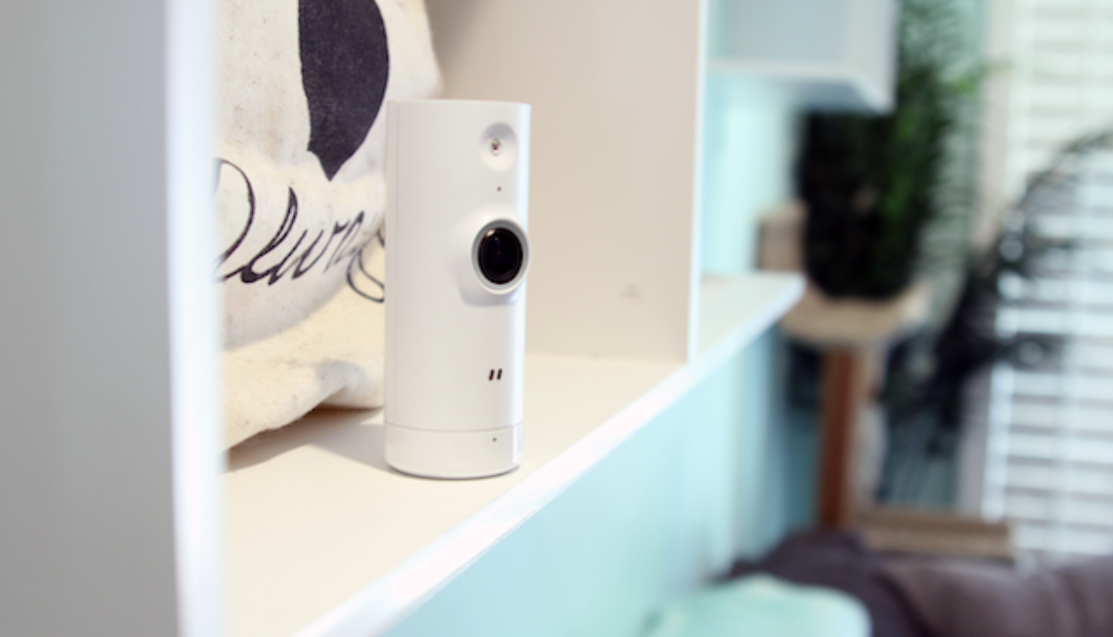D-Link Mini Full HD Wi-Fi Camera DCS-8000LHV2
Manual Overview
D-Link reserves the right to revise this publication and to make changes in the content hereof without obligation to notify any person or organization of such revisions or changes. Information in this document may become obsolete as our services and websites develop and change. Please refer to the www.mydlink.com website for the most current information.
Product Overview
Package Contents

If any of the above items are missing, please contact your reseller.
Note: Using a power supply with a different voltage rating than the one included with your product will cause damage and void the warranty for this product.
Introduction
The DCS-8000LHV2 Mini Full HD Wi-Fi Camera is a compact wireless network camera suitable for day and night time environments. It features built-in night vision, motion and sound detection, and a free mobile app — so you can feel at ease when you’re away from home. Despite its small size, the DCS-8000LHV2 has all the features you need for monitoring your home. Person detection allows you to be notified of human motion as it can distinguish people from other moving objects. Unlike other cameras that bog you down with a never-ending stream of irrelevant motion-detection alerts, this camera is smart enough to send you an alert only when it really matters. Built-in motion and sound detection will automatically send alert notifications to your mobile device. Night-time monitoring is possible with the built-in infrared LED which allows for night-time viewing of up to 16 feet, so you can relax knowing you have 24/7 monitoring of your home or small office.
System Requirements
| Network Requirements |
|
| mydlink™ App Requirements |
|
Hardware Overview
Front

|
1 |
Infrared LEDs | Illuminate the camera’s field of view in low light environments. |
|
2 |
Microphone | Picks up sound near your camera. |
|
3 |
Camera Lens | Records video of the surrounding area. |
|
4 |
Light Sensor | The IR-Cut removable sensor monitors lighting conditions and switches between color and infrared accordingly. |
|
5 |
Status LED | Refer to LED Behavior for more information. |
Back

|
1 |
microUSB Power Port | Attach your microUSB power adapter to this port to supply power to the device. |
|
2 |
Reset Button | Hold the recessed button down to reset the camera to factory default settings. |
LED Behavior

| Status LED |
|
Connected to Wi-Fi and mydlink |
|
|
Powering on | |
|
|
Ready for set up | |
|
|
Upgrading firmware – do not power off |
Installation
Safety
Please read all of the safety and operating instructions before using device:
- Do not open the device or attempt to repair it.
- Do not submerge the device in liquid or attempt to clean it with liquids or solvents. To clean the device, disconnect it from the power outlet and use a damp towel to gently wipe it down.
Before You Begin
Plan the location of your camera:
- Verify that your camera is electrically rated to operate with the power available in your location.
- Connect the camera’s power adapter into an electrical outlet that is not controlled by a wall switch. This will help avoid accidentally turning off power to the device.
- Be sure to plug the device into a properly grounded electrical outlet in order to help prevent against electrical shock.
- Make sure that the device is firmly mounted.
Wireless Installation Considerations
The DCS-8000LHV2 Mini Full HD Wi-Fi Camera lets you view video footage from virtually anywhere within the operating range of your wireless network. Keep in mind that the number, thickness and location of walls, ceilings, or other objects that the wireless signals must pass through may limit the range. Typical ranges vary depending on the types of materials and background RF (radio frequency) noise in your home or business. The key to maximizing wireless range is to follow these basic guidelines:
- Keep the number of walls and ceilings between the camera and wireless access point to a minimum – each wall or ceiling can reduce your camera’s range from 1 to 30 meters (3 to 90 feet). Position your devices so that the number of walls or ceilings is minimized.
- Be aware of the direct line between network devices. A wall that is 0.5 meters (1.5 feet) thick, at a 45-degree angle appears to be almost 1 meter (3 feet) thick. At a 2-degree angle it looks over 14 meters (42 feet) thick! Position devices so that the signal will travel straight through a wall or ceiling (instead of at an angle) for better reception.
- Building materials make a difference. A solid metal door or aluminum studs may have a negative effect on range. Tryto position access points, wireless routers, and cameras so that the signal passes through drywall or open doorways. Materials and objects such as glass, steel, metal, walls with insulation, water (fish tanks), mirrors, file cabinets, brick, and concrete will degrade your wireless signal.
- Keep your product away at least 1 to 2 meters (3 to 6 feet) from electrical devices or appliances that generate RF noise.
mydlink App Camera Setup
- Download the mydlink app from the App Store (iOS) or Google Play (Android) by scanning the QR code.Note: Ensure that your device is wirelessly connected to the network that the DCS-8000LHV2 will be in.

- Launch the mydlink app and create a new account or sign in to your existing account.Note: If you are asked about allowing the app to access your location or to send notifications, select Allow. Make sure location services and Bluetooth are turned on in your phone’s settings.

- After logging in, tap the Menu button in the top-left corner.

- Select Add a Device.Follow the onscreen instructions to complete the device setup.

Device Placement
Place the camera at least 1.3 meters from the ground. The viewing distance for Person Detection is between 2 – 5 meters.

Mounting the Camera
- Position the baseplate on the wall. Keep it in the same place while using a pencil to mark the two holes.

- Drill two 25 mm deep holes with a 6 mm drill bit over the pencil marks. If necessary, hammer in the plastic wall anchors to support the screws.

- Place the baseplate on the wall where you can see both holes through the baseplate. Screw the screws into the wall to secure the baseplate.

- Place the camera into the mount, ensuring that the power port in the back is exposed. Plug the USB power cable into the camera ensuring it is plugged in all the way.

- Align the markings on the camera mount and baseplate. Press the camera mount onto the baseplate.

- Twist the camera mount slightly to the right to lock it onto the baseplate. Adjust the camera angle, then tighten the screw on the left to lock it in place.

Using the mydlink App
Controlling Your Device
Note: Screenshots are representative only. The mydlink app is constantly being updated and so may appear different.After setting up your DCS-8000LHV2 Mini Full HD Wi-Fi Camera with a mydlink account in the mydlink app, you will be able to remotely access your camera through the app. After signing into your mydlink account, you will see a screen similar to the one on the right.

If you have previously checked the Add to shortcut option while installing the camera, you will see a quick link to your camera directly on the home screen. Tap the shortcut link to your camera on the home screen and by default you will see a live video feed of your camera on the top half of the app.
To access the settings for your DCS-8000LHV2Mini Full HD Wi-Fi Camera, tap Menu > Devices > Camera > Navigate to Your Camera on the Carousel > Setting.

Camera Options
On the bottom half of the app you will see control options for your camera.
| Snapshot | Tap this button to take a snapshot of the video stream. |
| Options Toggle | Tap this icon to review various live video options such as microphone and video quality. |
| Recording | Tap this button to enable video stream recording. |

Tap Menu to toggle the Options menu.
| Audio | Tap to disable audio. Tap to enable audio. |
| Video Resolution | Tap 720p to use 720p resolution video. Tap 1080p to use 1080p resolution video. |

Device
To access the device page, either:
- From the home page, tap > Devices > Camera > navigate to your camera on the carousel > or
- In the camera control page, tap the button.
The device page contains several options for you to configure your camera.


|
1 |
Device Photo |
Tap to add a customized photo of this device. |
|
2 |
Device Name |
Tap to change the device’s name. |
|
3 |
Device Location |
Tap to change or add a new location for this device. |
|
4 |
Wi-Fi |
Tap to change the wireless network this device will use to connect to the Internet.Note: The network must be the same as all your other mydlink devices that you wish to use the same account for. |
|
5 |
Designated Contact |
Tap to add, remove, or edit designated contacts that appear in the rich notification. |
|
6 |
Camera Microphone |
Tap to enable or disable the device’s microphone. |
|
7 |
Motion Setting |
Tap to further configure sensitivity and the active area of motion detection. |
|
8 |
Night Vision |
Tap to change night vision detection to On, Off or Auto. |
|
9 |
Anti-Flicker |
Reduces flicker in the video. Tap 50Hz or 60Hz depending on the frequency of your lights. |
|
10 |
Enable Camera LED |
Disabling this will turn off the LED until you turn it back on. |
|
11 |
Privacy Mode |
Tap to enable Privacy Mode. Privacy mode will disable the camera feed. |
|
12 |
Invert Image |
Enable this to invert the camera view. |
|
13 |
Storage |
Tap to view the storage location and your current subscription plan. |
|
14 |
Firmware Update |
Shows time of auto firmware upgrade. Tap to enter the firmware upgrade settings. You can choose the most suitable time for automatic updates. |
|
15 |
Current Firmware Version |
This displays your devices’ firmware version |
|
16 |
Device ID |
Identifies the device for support issues. |
|
17 |
Remove Device |
Tap this button to disconnect this device from your mydlink account. |
Troubleshooting
What do I do if my device is not working properly?Reset the device and reinstall it. To reset your device, press and hold the Reset button until the LED turns solid red. During installation, ensure that:
- Your router is connected to the Internet and has Wi-Fi enabled
- Your mobile device is connected to your router’s Wi-Fi and has Bluetooth enabled
- Your mydlink device is in range of your Wi-Fi network
Why is there a white haze when viewing in night vision mode?When viewing in night vision mode, the IR lights on your camera may be reflecting off a nearby surface. Try repositioning your camera to avoid glare from IR LEDs.
How do I switch back to managing my device through mydlink if I’ve configured the device through an ONVIF system?If your device settings were changed by another system, it can no longer be accessed through mydlink until you press and hold the Reset button to restore it to factory settings. After resetting the device, set it up again via the mydlink app in order to use services from mydlink.
How can I use voice commands to control my device?The device will work with both Amazon Alexa and the Google Assistant. For setup instructions on these services, visit the following websites:Alexa: https://www.dlink.com/en/alexaThe Google Assistant: https://www.dlink.com/en/google-assistant
Technical Specifications
|
Camera |
||
| Hardware Profile |
|
|
| Image Features |
|
|
| Video Support |
|
|
| Audio Support |
|
|
|
Network |
||
| Connectivity |
|
|
| Network Protocols |
|
|
|
System Integration |
||
| Event Management |
|
|
| Device Management |
|
|
|
Physical |
||
| Environment |
|
|
| Weight |
|
|
| Power Adapter |
|
|
| Power Consumption |
|
|
| Temperature |
|
|
| Humidity |
|
|
| Certifications |
|
|
| Dimensions ( L x W x H) |
|
|
| Diagram |  |
|
|
Order Information |
||
| Part Number | Description | |
| DCS-8000LHV2 | Mini Full HD Wi-Fi Camera |
Regulatory Information
Federal Communication Commission Interference StatementNOTE: This equipment has been tested and found to comply with the limits for a Class B digital device, pursuant to part 15 of the FCC Rules. These limits are designed to provide reasonable protection against harmful interference in a residential installation. This equipment generates, uses and can radiate radio frequency energy and, if not installed and used in accordance with the instructions, may cause harmful interference to radio communications. However, there is no guarantee that interference will not occurin a particular installation. If this equipment does cause harmful interference to radio or television reception, which can be determined by turning the equipment off and on, the user is encouraged to try to correct the interference by one or more of the following measures:
- Reorient or relocate the receiving antenna.
- Increase the separation between the equipment and receiver.
- Connect the equipment into an outlet on a circuit different from that to which the receiver is connected.
- Consult the dealer or an experienced radio/TV technician for help.
Non-modification StatementAny changes or modifications not expressly approved by the party responsible for compliance could void the user’s authority to operate the equipment.
CautionThis device complies with Part 15 of the FCC Rules. Operation is subject to the following two conditions:
- This device may not cause harmful interference, and
- This device must accept any interference received, including interference that may cause undesired operation.
This device and its antenna(s) must not be co-located or operating in conjunction with any other antenna or transmitter except in accordance with FCC multi-transmitter product procedures. For product available in the USA/Canada market, only channel 1~11 can be operated. Selection of other channels is not possible.
NoteThe country code selection is for non-USA models only and is not available to all USA models. Per FCC regulations, all WiFi product marketed in the USA must be fixed to USA operational channels only.
IMPORTANT NOTICE:
FCC Radiation Exposure StatementThis equipment complies with FCC radiation exposure limits set forth for an uncontrolled environment. This equipment should be installed and operated with minimum distance 20 cm between the radiator and your body.
Innovation, Science and Economic Development Canada (ISED) Statement:This Class B digital apparatus complies with Canadian ICES-003.Cet appareil numérique de la classe B est conforme à la norme NMB-003 du Canada.
Innovation, Science and Economic Development Canada (ISED) Statement:This device complies with ISED licence-exempt RSS standard(s). Operation is subject to the following two conditions:
- This device may not cause interference, and
- This device must accept any interference, including interference that may cause undesired operation of the device.
Radiation Exposure StatementThis equipment complies with ISED radiation exposure limits set forth for an uncontrolled environment. This equipment should be installed and operated with minimum distance 20 cm between the radiator and your body.
References
[xyz-ips snippet=”download-snippet”]




